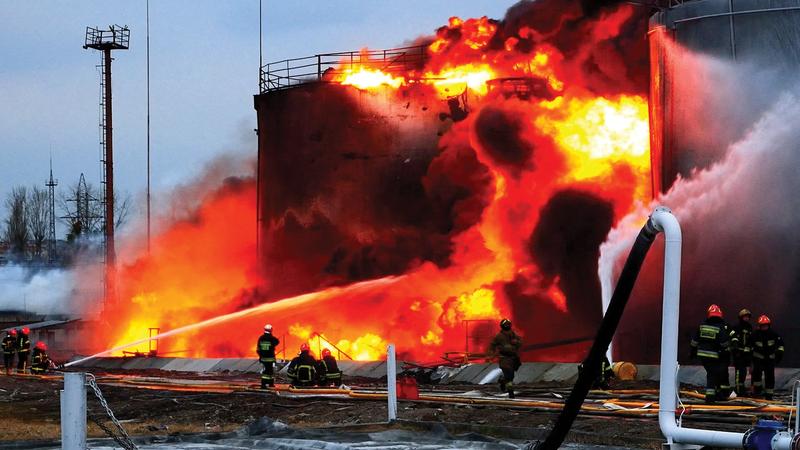 A photograph issued by the Ukrainian State Emergency Service shows firefighters putting out a fire at a fuel storage depot in the western city of Lviv after Russian missile strikes on March 26. The West is pushing Arab nations to raise oil production to contain soaring prices spurred by the conflict. (PHOTO / AFP)
A photograph issued by the Ukrainian State Emergency Service shows firefighters putting out a fire at a fuel storage depot in the western city of Lviv after Russian missile strikes on March 26. The West is pushing Arab nations to raise oil production to contain soaring prices spurred by the conflict. (PHOTO / AFP)
Western pressure on Gulf nations to pump more oil amid the Russia-Ukraine conflict could derail the Gulf region’s economic diversification and its climate commitments, experts warn.
Saudi Arabia, the UAE and Qatar — key members of OPEC, the Organization of the Petroleum Exporting Countries — have remained hesitant to increase oil and gas exports amid pressure from the United States, European Union countries and Japan. The other Gulf nations comprise Oman, Kuwait and Bahrain.
Russia is the world’s third largest oil producer behind the United States and Saudi Arabia, according to the International Energy Agency. The West’s Arab oil push is aimed at stabilizing the global energy market and containing soaring prices spurred by the Russia-Ukraine conflict.
Prices of fuel oil and gas have spiked in the EU after the US and some EU countries imposed sanctions on Russia’s exports. Oil prices have hit more than $130 a barrel in March. On Feb 24, the day Russia attacked Ukraine, oil prices hovered at around $100 a barrel.
Salman Zafar, founder of Eco-MENA, an environmental think tank in Doha, Qatar, told China Daily that the realization of climate goals in the Gulf Cooperation Council region will be hampered if Saudi Arabia and the UAE decide to raise their oil output to gain geopolitical and economic leverage with Western countries.
“In the past decade or so, the Gulf countries have made steady progress, albeit slow, in transitioning to a low-carbon economy, but it may be undone if there is a renewed focus on oil production,” said Zafar.
“Climate change mitigation is a one-way road, and the Gulf countries should be wary of long-term impacts of anthropogenic emission of greenhouse gases from the oil industry,” he added.
Yesar Al-Maleki, an energy expert and Gulf Analyst at Middle East Economic Survey, an energy publication in Cyprus, said that in terms of economic diversification, an oil price boost is a “two-edged sword”.
“Historically, these (diversification) plans would be abandoned with higher oil prices, which in turn lead to greater government spending within the economy. Oil volatility has always caused cyclical spending by Gulf countries,” he said.
Al-Maleki said that while prices are high and oil revenues are up, GCC producers like Saudi Arabia and the UAE are keen to see their diversification plans go through. The higher revenues will see some of their climate ambitions financed, he said.
In October last year, Saudi Arabia’s Crown Prince Mohammed bin Salman launched the Middle East Green Initiative, aiming to secure about $10.4 billion for an investment fund and clean energy project to reduce regional carbon emissions. He also pledged that the country would reach net zero emissions by 2060 by investing more than $186 billion into the green economy over that time.
The UAE, also in October last year, announced its aims to hit net zero by 2050.
Although leaders of the UAE and Saudi Arabia have reiterated the importance of global energy security and energy market stability, they have not increased output.
At the Doha Forum on March 27, Ahmad bin Mohamed Al Sayed, Qatar’s Minister of State and chairman of the Qatar Free Zones Authority, said oil-producing countries in the GCC must remain focused on their economic diversification efforts despite the recent surge in global oil prices, The Peninsula, an English-language daily in Doha, reported.
Anis Khayati, an economics professor at the University of Bahrain, said it is “short-sighted” to imagine that the Gulf states have no interest in the Russian-Ukraine war. Therefore, appeals to increase oil production “have fallen on deaf ears”.
Khayati believes the decline in relations between the “oil powers in the Middle East” and Washington could “rearrange” the regional order in the interest of the Gulf countries.
“The Gulf also wants to convey a message to Washington that this war is not our war, which is very similar to the message that the Americans have been sending them for several years about Yemen,” Khayati said.
Xinhua contributed to this report


